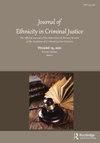Maximizing order or harm? Arrests among a social network of people who inject drugs in a large urban city
IF 1
Q3 CRIMINOLOGY & PENOLOGY
引用次数: 2
Abstract
Abstract Encountering the criminal justice system at the first point of entry---an arrest---is associated with heightened HIV and Hepatitis risk behavior among people who inject drugs (PWIDS). Intervening structurally through the criminal justice system impacts public health; therefore, determining arrest patterns is an important tool for risk reduction. Among a sample of 740 PWIDs, and their social network members recruited from predominantly African-American neighborhoods in Baltimore City, a third were recently arrested in the previous six months, and of those, the arrests were disproportionately African-American persons and characterized as nonviolent, i.e., drug possession/attempt to purchase (38%) and loitering (29%). Poisson regression models were built adjusted for age, sex, race, education level, homelessness, and monthly income after exploring bivariable characteristics of arrests using chi-squared tests. Active drug use was associated with a recent arrest (adjusted prevalence ratio: aPR 2.38 95% CI 1.6, 3.6), in addition to participants who recently reported attending a syringe exchange program (aPR 1.45 95% CI 1.1, 2.0). Our findings are suggestive of recent media coverage and burgeoning research revealing the prioritization of policing resources toward both communities of color and neighborhoods of intensified drug trafficking. Further research is warranted to contextualize the operationalization of criminal justice resources and the impact on community health.最大化秩序还是最大化伤害?在大城市的一个注射毒品的社会网络中逮捕了一些人
在第一个入境点(逮捕)遇到刑事司法系统与注射吸毒者(PWIDS)中艾滋病毒和肝炎风险行为的增加有关。通过刑事司法系统进行结构性干预会影响公共卫生;因此,确定逮捕模式是降低风险的重要工具。在巴尔的摩市以非洲裔美国人为主的社区招募的740名PWIDs及其社交网络成员的样本中,三分之一的人最近在过去六个月内被捕,其中,被逮捕的非裔美国人比例不成比例,并且被描述为非暴力,即持有毒品/企图购买(38%)和闲逛(29%)。在使用卡方检验探索逮捕的双变量特征后,建立了泊松回归模型,调整了年龄、性别、种族、教育水平、无家可归和月收入。除了最近报告参加注射器交换计划的参与者(aPR 1.45 95% CI 1.1, 2.0)外,活跃药物使用与最近的骤停有关(调整患病率:aPR 2.38 95% CI 1.6, 3.6)。我们的发现暗示了最近的媒体报道和新兴的研究,这些研究揭示了警务资源优先用于有色人种社区和毒品贩运加剧的社区。有必要进一步研究刑事司法资源的运作情况及其对社区卫生的影响。
本文章由计算机程序翻译,如有差异,请以英文原文为准。
求助全文
约1分钟内获得全文
求助全文
来源期刊

Journal of Ethnicity in Criminal Justice
CRIMINOLOGY & PENOLOGY-
CiteScore
1.70
自引率
16.70%
发文量
16
期刊介绍:
The Journal of Ethnicity in Criminal Justice explores the prejudice that currently affects our judicial system, our courts, our prisons, and our neighborhoods all around the world. This unique multidisciplinary journal is the only publication that focuses exclusively on crime, criminal justice, and ethnicity/race. Here you"ll find insightful commentaries, position papers, and examinations of new and existing legislation by scholars and professionals committed to the study of ethnicity and criminal justice. In addition, the Journal of Ethnicity in Criminal Justice presents the latest empirical findings, theoretical discussion, and research on social and criminal justice issues.
 求助内容:
求助内容: 应助结果提醒方式:
应助结果提醒方式:


